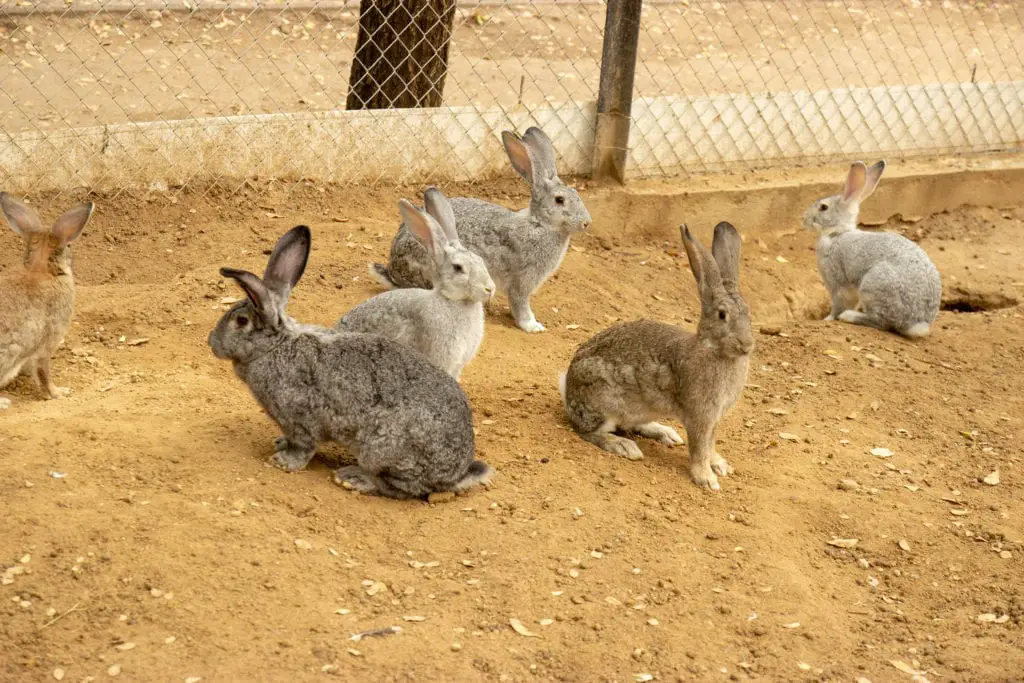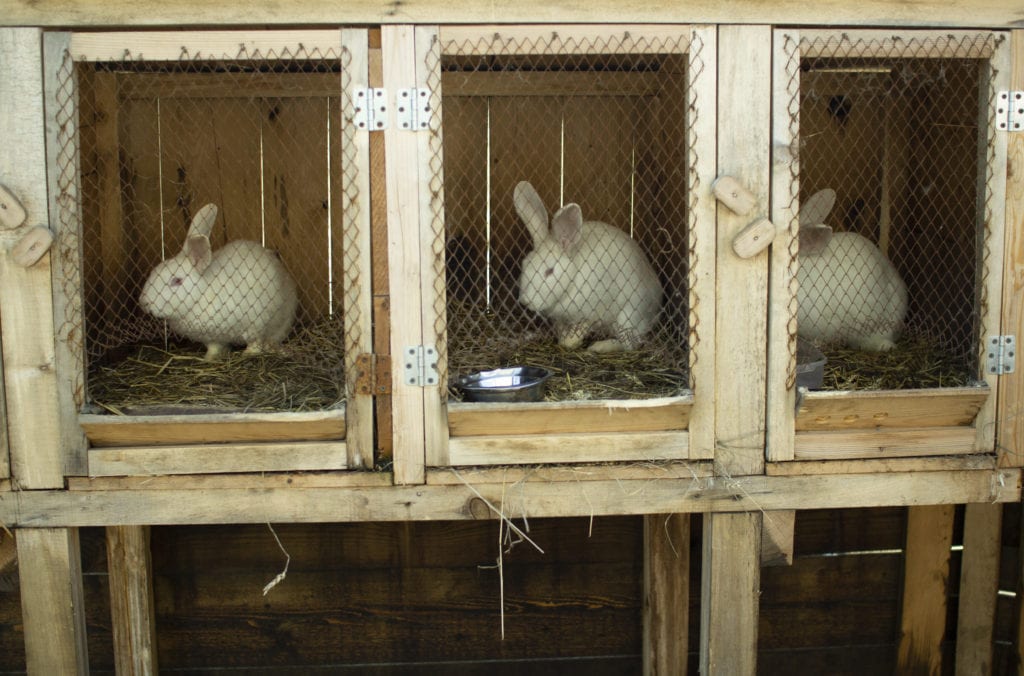
We’ve all heard about how quickly and easily rabbits can breed. Females can even become pregnant on the same day they give birth! But is it possible for rabbits to mate when they’re in separate cages?
99% of the time, rabbits cannot mate through a cage because they cannot get close enough to each other. However, if two separate rabbit cages are placed next to each other, they may attempt to bite, pull fur, or otherwise engage with each other through the openings in order to try and mate.
Even though it’s nearly impossible for rabbits to mate through a cage, they can become pregnant more easily than you might expect. For more information on rabbit breeding habits, ways to identify pregnancy, and tips on proper separation, there are far more things to learn below!
Rabbits and Breeding
Rabbits can breed quickly and often. Unlike wild rabbits, domesticated rabbits can breed any time of the year. If your rabbits did mate, there’s an extremely good chance that the female will become pregnant. Rabbits are very fertile animals and there’s a 95% success rate when they breed. Can Rabbits Mate With Siblings? is an important safety question to ask. When rabbits mate with siblings, there could be life-altering risks such as birth defects involved, but there also may be positive outcomes – check out my article on this topic to learn more.
The best way to avoid this is to have your rabbits spayed and neutered as soon as possible. Female rabbits can be treated when they are 4-6 months old, while males can be neutered at 8-12 weeks.
Generally, female rabbits will be pregnant for about 31 days (or 1 month) before they give birth. Even though it’s hard to be 100% sure at home, there are a few warning signs you can watch for if you think your rabbit might be pregnant.
Identifying Pregnancy in Rabbits

If you’re worried that your rabbits might have mated but aren’t sure, keep an eye on the female over the next few weeks. If she is pregnant, there are a few things you can watch out for that will let you know early.
Personality Changes:
First of all, your female rabbit might start to behave differently if she’s pregnant. If she’s usually quite calm and docile, she might start to become territorial and aggressive. Are Pregnant Rabbits Aggressive? This article will tell you all you need to know when taking care of an expecting mother, new mother, and her kits. You need to make sure their health and safety are top priorities when dealing with these circumstances.
The inverse is also true! Pregnancy is calming for some rabbits who are usually more dominant.
No Longer Interested in Mating:
If your rabbit is already pregnant, they won’t be interested in mating again. They may reject males that approach and become standoffish. Rabbits who are usually submissive can display this behavior as well, which can be a big warning sign of pregnancy.
Increased Appetite and Weight Gain:
Just like with people, pregnancy in rabbits can manifest in weight gain and a heartier appetite! Expecting mothers are now eating for 2 (or up to 15 in a rabbit’s case!)
Nesting Behaviors:
All rabbits enjoy burrowing and tunneling, but pregnant females may develop new nesting behaviors as well. If you offer them hay or straw and they take it away to a specific corner of the cage, this could be a sign of nesting behavior.
Keep an eye out for a nest of bedding, straw, and other comfort items. This is telling behavior that could mean. that your rabbit is pregnant.
Larger Stomach:
Obviously, a pregnant rabbit’s body needs to make room for the babies! If you notice significant weight gain, especially in the stomach that probably means a litter of babies is on the way.
You can check this by gently holding your rabbit and feeling her stomach. If it feels noticeably larger, that’s something you should check on regularly. If it’s bloating it should go away after a few days while pregnancy weight gain will stay.
TIP: If you suspect your rabbit may be pregnant, you’ll need to know how to take care of your momma rabbit after she gives birth. Her safety and the safety of her kittens will depend on what you do in the vulnerable days leading up to, and after, the birth.
Sleeping More Often:
All mothers need their sleep! Rabbits may rest or nap throughout the day, but if your female is sleeping much more frequently than usual, that might be a sign that she’s getting ready to give birth.
Faster Heart Rate and Breathing:
Pregnant rabbits have elevated vital signs in the first few days/weeks after conception begins. If you notice your female is breathing quickly or panting, your should check her pulse as well. If it’s rapid as well, that’s something you should keep an eye on.
Even if think your rabbit isn’t pregnant, you should keep track of these warning signs. They could point to other health issues as well.
Vet Check:
Finally, you should take your rabbit in for a checkup at the vet if you’re not sure. It can be hard to tell for sure whether or not rabbits are pregnant, even if you’re paying very close attention.
Vets should be able to give you a better idea of what’s going on with your cotton-tailed friend.
How to Properly Separate Rabbits

Rabbits may need to be separated from time to time, whether it’s for bonding, breeding, surgery recovery, or other reasons.
Although there are a few accounts of rabbits who may have become pregnant even though they were placed in separate cages, it’s hard to say if any of these are accurate. The rabbits could have been pregnant beforehand or mated before being separated.
In the unlikely case that two rabbits were able to successfully breed through a cage wall, the cages were probably placed too close together and had openings that were too large. Those problems are both easy to address.
Generally speaking, as long as there’s even a little gap between the cages, you shouldn’t have to worry about rabbits bothering each other. Mating is extremely unlikely, but they could still bite, paw each other, or pull fur if they’re placed too close together.
When rabbits need to be separated, you should start by preparing two separate cages for them. Both of these should be comfortable and equipped with food, water, bedding, litter, and anything else they need to feel at home.
If your rabbits are bonded to each other, you can place their cages close together in the same room. Being able to see, hear, and smell each other will help comfort them during the separation. Maintain a distance of at least 4-5 inches to make sure they can’t get close enough to touch.
If your rabbits are unbonded, fighting, or in heat, it might be best to keep them in separate rooms for a while. Give them enough time to get used to being alone (or recover in the case of surgery) before re-introducing them.
Again, keep the cages at a distance when you’re trying to bond rabbits. Allow them to get used to the idea of each other. For a full step-by-step article about How to Bond a Baby Rabbit to an Older Rabbit, check out my article for things I wish I would have known when starting the process.
